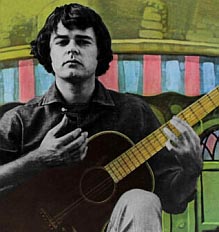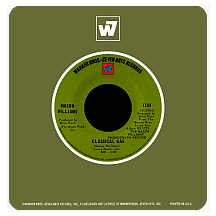MASON WILLIAMS
Classical Gas
The career of Mason Williams encompasses many details, detours and triumphs. His list of achievements fall under several categories: he's a musician (folk singer, conductor, multi-instrumentalist), writer (songs, poems, books and comedy-variety television shows), visual artist (usually along avant-garde lines), and it's likely he has other skills that aren't as obvious. Most famously, he's recognized for his 1968 million seller "Classical Gas." It's fair to say a variety of interests went into the making of this modern sendup of guitar technique and vintage orchestral style, plus his quirky pop art side is evident on the cover of the album that housed the hit single.
Mason was born in Abilene, Texas and grew up in Oklahoma City, getting his first taste of music in high school choir; after graduation in 1956 he headed to Los Angeles, hung out constantly at folk and jazz clubs and decided this was the career to pursue. Going back home, he attended Oklahoma City University as a music major focusing on piano and flute, later picking up guitar and studying flamenco and other techniques. He was in The Nightlighters with banjo man Bill Cheatwood and singer Baxter Taylor; the trio spent most nights in 1959 and '60 performing in local clubs. At one such nightspot called the Gourd, he teamed with bassist Joe Lawrence and singers Steve Brainard and Johnny Horton. The four recorded an album, Folk Music as Heard at the Gourd, a one-shot live set issued on the club's own Gourd Label Records.
The Nightlighters name was scrapped in favor ot The Wayfarers Trio and Mercury Records signed the act in the summer of 1960. The folk standard "Run, Come See" ('...Jerusalem') was issued as a single that fall, followed several months later by a Civil War-related concept album, Songs of the Blue & Grey. The trio spent the summer of '61 appearing at the Troubadour and other top clubs in Southern Cal before calling it quits. Back at OCU that fall, Williams took up banjo and performed with future New Christy Minstrel Mike Settle, then spent much of 1962 in military duty at the Naval base in San Diego, California. He formed a new folk group, The Hootenairs, with guitarist John Powell, dulcimer player Marilyn Powell and bassist Ed Douglas; they became regulars in San Diego nightclubs and recorded an album, More Hootenanny, issued on the Crown label in 1963. Meanwhile, Mason published a book of poems, Bicyclists Dismount, and put out a solo LP in 1964, Them Poems.
His songs were recorded by The Kingston Trio, Glenn Yarbrough and Tom and Dick Smothers; in '65 he was an opening act (along with Esther and Abi Ofarim, for whom he penned their later hit "Cinderella Rockefella") on a tour headlined by The Smothers Brothers. In the summer of '66, Mason released a solo single on Mercury, "Love Are Wine" ('...ladies is great'), a vocal comparison of romance and inebriation. After a few more independently-published books, he stepped into the world of TV, taking a job as a staff writer for The Roger Miller Show, which had a brief run from September to December. Multitasking, a rather new slang term at the time, was a fitting description of Mason's work ethic. Following a short-lived '65-'66 sitcom starring the brothers (with Tom playing an angel), The Smothers Brothers Comedy Hour premiered on CBS in February 1967 with Williams wearing two hats, working in the music and script departments; the entire writing staff scored an Emmy nomination for Writing Achievement in Music or Variety. He also moonlighted as a writer for TV variety specials starring Petula Clark and Andy Williams.

The following year, while still a key part of the Smothers show, Williams recorded his first album for Warner Bros.-Seven Arts, The Mason Williams Phonograph Record, with a cover showing him standing next to a life-size, optically-altered photo of a Greyhound bus that he'd created and exhibited at the Museum of Modern Art. "Classical Gas," its lead single, came at a time when instrumentals were enjoying a resurgence in popularity; his acoustic guitar work opened the piece as it developed into a huge pop symphony with strings and brass; its striking arrangement might have caused Beethoven to scoff yet thrilled modern music fans except, perhaps, classical purists. A music video was produced that superimposed Williams' guitar playing over a tightly-edited film by Dan McLaughlin depicting 3000 Years of Art in 3 Minutes. The record reached number one on the Cash Box singles chart and number two on Billboard in August of '68 while he was busy working as a staff writer for The Summer Brothers Smothers Show hosted by Glen Campbell.
Sophomore WB album The Mason Williams Ear Show featured "Baroque-a-Nova," another modern-classical pop piece that made its best showing in the top 20 of the Easy Listening charts late in '68. A vocal track, "Saturday Night at the World," reached the Easy top 20 a couple of months later. Williams cleaned up on the awards front in 1969; at the Grammys, handed out in March, he won twice for "Classical Gas," in the Instrumental Theme and Contemporary Pop Performance, Instrumental categories, while a third award went to Mike Post for Instrumental Arrangement. Three months later he (and ten other staffers) won an Emmy for Writing Achievement in Comedy, Variety or Music for The Smothers Brothers Show. Two other singles that year ("Greensleeves," Great Britain's famous 16th century tune, and "A Gift of Song") made minor chart appearances. A third Warner album, Music, brought the decade to an end.
Handmade in 1970 and Sharepickers in 1971 offered a variety of mostly-original instrumental and vocal tracks as earlier efforts had; the five albums made up Mason's entire output for Warner Bros. During this time he put together a band, staged several concert tours and appeared regularly on television. But his self-imposed, ultra-creative and extremely busy schedule over the previous decade reached its breaking point. He "dropped out" for awhile, traveled around, got married and re-emerged in the mid-'70s leading a New Mexico-based bluegrass group, The Santa Fe Recital. They recorded an album, "Fresh Fish," for the regional Flying Fish label and toured extensively, later adding an orchestra and billing the shows as "Symphonic Bluegrass." Along the way, he joined the writing staff of a revived Smothers Brothers Show that lasted just 13 weeks.
After several more years of bluegrass tours, he gave TV writing another whirl with a short stint for Saturday Night Live in 1981. A musical collaboration with Mannheim Steamroller yielded an '87 revival of "Classical Gas," the result less spectacular than one might expect from the popular Fresh Aire orchestra. In 1988 and '89, he jumped on board for a second-encore Smothers Brothers Comedy Hour. There was no shortage of awards recognition during those years as Grammy, Emmy and Writers Guild nominations came at a steady clip. Mason Williams' work in writing and publishing, and more notably a deep-seated obsession with composing and performing instrumental (and sometimes vocal) music, kept his career going strong for a half-century. His three minute masterpiece from 1968 has frequently worked its way into his performances.


